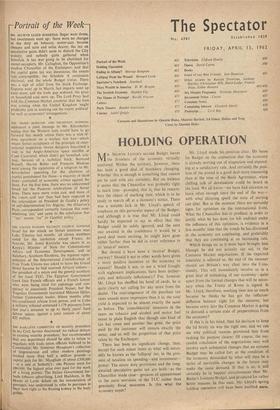HOLDING OPERATION
MR. SELWYN LLOYD's second Budget leaves the frontiers of the economy virtually unaltered. Within the territory, however, there has been a good deal of boundary changing. Whether this is enough is something that cannot yet be said with any certainty. But on balance it seems that the Chancellor was probably right to mark time—provided, that is, that he remem- bers the object of marking time, which is to be ready to march off at a moment's notice. There was a notable lack in Mr. Lloyd's speech of emphasis on this particular aspect of the Budget; and although it is true that Mr. Lloyd could hardly be expected to say in effect that this Budget could be safely ignored, and the next one awaited in the confidence it would be a good deal more exciting, he might have gone rather farther than he did in overt reference to its 'neutral' nature: But should it have been a 'neutral' Budget, anyway? Should it not in other words have given a more positive incentive to the economy to expand? Should it not, to use a word fraught with nightmare implications, have been deliber- ately and delicately inflationary? For, however Mr. Lloyd has shuffled his hand of cards, he is quite clearly not calling for any more from the dealer. The rearrangement of the purchase tax rates sounds more impressive than it is; the total yield is expected to be almost exactly the same as before. The 'consolidatiPn' measures in the taxes on tobacco and alcohol and motor fuel mean in plain English that though one kind of tax has come and another has gone, the price paid by the customer will remain exactly the same; and so will the proportion of that price taken by the Exchequer.
There has been no significant change, then, except for such minor items as what will inevit- ably be known as the 'lollipop' tax, in the pres- sure of taxation on spending—and investment— power. The estate duty provisions and the long- awaited speculative gains tax are both—as the Chancellor made clear—gestures of appeasement to the stern moralists of the TUC rather than genuinely fiscal measures. Is this what the economy needs? Mr. Lloyd made his position clear. He bases his Budget on the contention that the economy is already moving out of stagnation and expand- ing at a satisfactory rate. And certainly the posi- tion of the pound is a good deal more reassuring than at the time of the Basle Agreement, when chilling talk of devaluation could be heard in the land. We all know—we have had occasion to learn often enough since the end of the war— with what dizzying speed the state of sterling can alter. But at the moment there are certainly signs for optimism on the international front. What the Chancellor has to produce, in order to justify what he has done (or left undone) under the influence of this optimism, is evidence in a few months' time that the trends he has discerned in the economy are continuing, and preferably that they are continuing at an increasing rate.
Which brings us, as it must have brought him (though he did not actually say so), to the Common Market negotiations. If the expected timetable is adhered to, the end of the summer • should see Britain's way clear into the Com- munity. This will immediately involve us in a great deal of rethinking of our economy—quite apart from the formal changes that will be neces- sary when the Treaty of Rome is signed. Is Mr. Lloyd, therefore, marking time not so much because he thinks he has got the inflation- deflation balance right for the moment, but because entry into the Common Market is going to demand a certain state of preparedness from the economy?
If this is in his Mind, then his decision to keep the lid firmly on was the right one, and we can see why political reasons prevented him from making his purpose clearer. Of course, the suc- cessful conclusion of the negotiations may well involve such substantial changes that an autumn Budget may be called for; or the condition of the economy demanded by what will then be a series of inevitable changes in the future may make the same demand. If that is so, it will certainly be in happier circumstances than Mr. Butler's footnote Budget, and produced for rather better reasons. In that case. Mr. Lloyd's spring holding operation will have been justified anew.


































 Previous page
Previous page